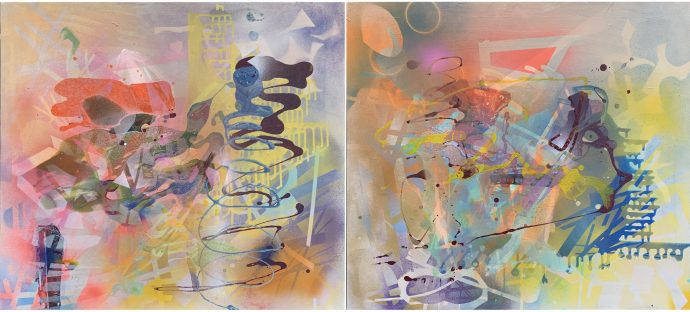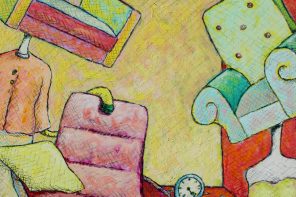Human babies steal your teeth but ghost babies steal your soul. That’s how Auntie Zhou lost hers after her husband died from brain cancer. She has a nursery in the huge, empty master bedroom, fashioned with a crib and blankets where the dresser once stood. Several times a week, she reorients the furniture, optimizing feng shui with changes in the position of the sun and rotation of the earth. According to Ben, Auntie Zhou didn’t even cry during delivery because she thought it’d draw evil spirits. She swallowed her tears like ginger water.
“Aren’t ghost babies the same as evil spirits?” I wonder.
“How can it be evil when it’s nourished by Auntie Zhou’s soul?” Ben asks.
We check up on Auntie Zhou once a week: wash her bed sheets, scrub down the bathtub, mow the lawn. Since losing her soul, she has been neglecting the chores she once did religiously. I have never been close with Auntie Zhou so her indifference doesn’t bother me. Auntie Zhou rarely visited our parents—not even when nai nai got a stroke in the middle of haggling down a fish head. We were all supposed to attend the funeral and put together money for ye ye’s living expenses and discuss how he was going to move in with one of us. But the only person who had spare room in their house was Auntie Zhou who found out about nai nai’s death two months later when nai nai’s jewelry arrived from China in cardboard boxes. I think she and her husband had been on one of those cruises populated with rich, retired bird watchers at the time.
The jewelry dad received from nai nai’s inheritance is supposedly for when Ben and I both get married. We must be draped in gold, all the world’s fortune glimmering on our bodies. We’re not sure what Auntie Zhou did with her portion since she prefers modern jewelry, an “avant-garde taste” composed of asymmetrical patterns and sterling silver. Gold and yellow are stale colors, according to her. But now she doesn’t even wear the silver bangle she claimed would suck out her body’s toxins. She drifts around the house with her ghost baby, singing lullabies and rocking the baby like it’s a basket of eggs.
Ben was there during the ghost baby’s delivery. Auntie Zhou had always been closer to him than me. She liked to call me a “crow girl” because I started wearing makeup and socializing with kids from families with Lamborghinis while Ben stayed holed up in his room playing video games. “What do you have left if you don’t stick to your true self?” She accused me of being fake.
“My true self is a social butterfly,” I said. I think she just didn’t like how she stumbled through her words when confronted by strangers, stuttering and messing up tenses and pronouns while you couldn’t tell English was my second language.
The baby flowed out of Auntie Zhou’s body. “Like the wind,” Ben tells me.
“Did you catch it in a jar?” I ask. If you don’t catch the ghost, there’s no hope in reclaiming your soul. The baby runs away with it.
“She wouldn’t let me,” Ben says.
“You’re not supposed to listen to her,” I sigh. “That’s how you end up with husk people.” Auntie Zhou is already like a corn husk, her baby hollowing her out, drying her up. The only reason she hasn’t turned full ghost is because ghost babies can’t steal your physical form like human babies can. Auntie Zhou still has all her yellowing, gum-receded teeth and she can squat flat-footed by the garden for hours while clipping pea shoots. She can lift buckets of shower water and haul them into the backyard to water the plants. She can reach her elbow back and pull up the zipper of her shiny black Ann Taylor dress without anyone’s assistance.
I’m not sure why Auntie Zhou wanted a ghost baby in the first place. Ghost babies are only liabilities from what I’ve seen. If she wanted someone to keep her company now that she’s a widow, she should’ve had a physical baby. And everyone knows ghost babies vanish into the atmosphere if you’re not careful, their form barely held together by the stolen souls of mothers, their bodies weak against the mass of already dissipated spirits lingering in the air.
I’m convinced Auntie Zhou’s baby has already been torn apart, particles scattered across the sea, although it’s not like Ben or I can tell. Only those who’ve birthed ghost babies know where they are, if they’ve left. People like us can only sense them during the split second they leave their mother’s bodies, the feeling of your bones freezing, your stomach lurching. Ben was throwing up for three days after Auntie Zhou’s delivery. I had to scrub away the vomit crusted on the upper sides of the toilet. Ben said he thought he’d never be warm again. I thought he’d been exaggerating.
I am sorting through Auntie Zhou’s mail when the cold cuts through the summer humidity. Letters spill out of her mailbox—mostly newspapers, the occasional flier to join the Chinese Christian Church, bank statements that get emailed anyway. I recycle most of it and place the remaining condolence letters on the counter. Only Auntie Zhou’s white friends send her letters with pre-printed messages in fancy envelopes. Her Asian friends deliver crates of vegetables and tofu purchased in bulk from their grocery WeChat group. Even soulless, Auntie Zhou cooks the vegetables. She never reads her letters. “Anyone who has anything important to say has my number or email and can message me there or fly to my house and chase me down. Easy enough to find my address these days online,” she’d say. But the envelopes look too fancy to recycle. If Auntie Zhou doesn’t read them after a year, I’m going to cut them up and use the fancy paper for wedding decorations.
As I flip through the letters, trying to count how many are from people I know, an icy, sharp breeze of air spreads through the room, heavy and dense, drowning me. When I open my mouth to breathe, the air seems to weigh my lungs down rather than provide oxygen. The cold presses over me. Auntie Zhou stands by the kitchen doorway, arms by her side, facial expression loose like she’s letting her skin sag straight off her bones.
“My baby left me,” she says, looking past me at the windows opening to the backyard.
“You sure?” I ask. “I just felt it.” Or what I think is it.
“There are too many gaps in this house,” she continues. “Too many holes. Have we filled the keyholes in the doors? Replaced the vent covers with solid covers? And these windows—we need to board them up.”
“How are you going to leave the house?”
Auntie Zhou shifts her gaze to me. “Who’s leaving this house? We already lost two. This is why kids like you end up dead so early—only thinking about meeting up with others, not considering family, and then poof—drug overdose or drunk driving or gunman gets you. You think I don’t read the news. I know what’s going on in this country.”
I try to change the conversation. “Will you still take care of your garden?”
“You think I’m a plant killer now, do you?”
“So you’ll leave the back door openable?”
“Ah?” Auntie Zhou says, her inflection rising. It’s the incredulous, caustic “ah” that she draws out, savoring each second of outrage. “Of course I will.”
“Nothing can escape through the back door?”
“The garden is part of this household. That’s not an escape.”
I don’t follow her logic on how this is supposed to prevent a ghost baby from dissipating, but Auntie Zhou has already begun closing and locking the windows, leaving the cold air trapped here.
“The cold isn’t good for aging knees,” I tell her. Ben kept reminding me to make sure Auntie Zhou wasn’t destroying her body. I figure with this, I’ve honored his request. He should’ve just come along if he cared so much, but he has an important gaming tournament right now and needs to be holed up in his room. I wonder if Auntie Zhou would think Ben was such a good kid if she knew he’d bailed today. She’d probably say it’s good he’s pursuing his hobbies unlike me, the hobbyless failure.
“You think I’m trying to climb to the heavens? What do I need sturdy knees for?” She continues slamming the windows shut. One of them is wide open and she reaches upward, unable to grasp the edge. I think Auntie Zhou has shrunk within the last year, but Ben thinks it’s just because we’ve grown taller, even though he’s the only one who has gotten taller and me wider—“too much salt, ballooning like a sponge” as Auntie Zhou likes to say.
“Help me close this,” she finally asks after brushing her fingers against the edge several times.
“Once a ghost baby is gone, it’s gone,” I say, not moving.
“Why do you always have so much to say? Just close this window.”
I head over to where she stands, and as I walk, the cold seems to follow. I shut the window and turn around. “Now what?”
“My baby is here, here.”
“Better stick it in a jar before it escapes.” Although I think the baby is better off escaping. Maybe it’d at least have a chance to see the lake where I’d go deep water soloing—climb several feet up and then jump. I tried to drag Ben with me because springing from the stone feels like flying through the universe, but he thought he’d die. Auntie Zhou thought the same when he accidentally told her where I often disappeared to. “Stupid risk-taking behavior,” she called it. The baby wouldn’t have much time to explore before it’d irrevocably dissipate.
“Where are those jars?” she mumbles. Auntie Zhou begins rummaging through the cabinets of takeout plastic containers she refused to throw away. The lids are punctured to let steam through, unable to contain leftover soup without leaking, never mind a ghost baby. I stand in front of the cabinet I know to contain the emptied and washed jars. They once held fermented tofu or rice or cabbage, but Auntie Zhou doesn’t care about ingesting every form of healthy gut bacteria anymore.
Auntie Zhou’s motions grow more and more rushed and erratic, her eyebrows increasingly scrunched, her lips pursed. I don’t budge from my position, guarding the glass jars.
“Tch,” she tsks. It’s the same sound she makes whenever someone does something wrong, like accidentally kicking water onto her pant cuff while they’re running through a puddle, a tsk that hauls blame like a mountain onto a person’s shoulders.
Auntie Zhou leaves the kitchen. I can hear her opening and closing doors of the closets and bathroom cabinets, her footsteps light as she treads into the basement to dig up tightly sealed jars. It sounds like she’s gently tearing the house apart. As quietly as possible, I open the cabinet I’m guarding and gather the ten glass jars and place them in one of those reusable fabric grocery bags that Auntie Zhou always forgets to bring to the store. I sneak out the back door which Auntie Zhou thinks she doesn’t need to barricade, and shatter the glass on the sidewalk. I imagine setting ten ghost babies free.
Lucy Zhang writes, codes, and watches anime. Her work has appeared in The Molotov Cocktail, Interzone, Hayden’s Ferry Review, and elsewhere. She is the author of the chapbooks Hollowed (Thirty West Publishing, 2022) and Absorption (Harbor Review, 2022). Find her at https://lucyzhang.tech or on Twitter @Dango_Ramen.




